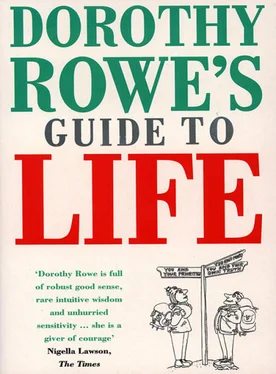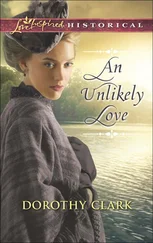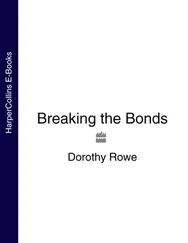Dorothy Rowe - Dorothy Rowe’s Guide to Life
Здесь есть возможность читать онлайн «Dorothy Rowe - Dorothy Rowe’s Guide to Life» — ознакомительный отрывок электронной книги совершенно бесплатно, а после прочтения отрывка купить полную версию. В некоторых случаях можно слушать аудио, скачать через торрент в формате fb2 и присутствует краткое содержание. Жанр: unrecognised, на английском языке. Описание произведения, (предисловие) а так же отзывы посетителей доступны на портале библиотеки ЛибКат.
- Название:Dorothy Rowe’s Guide to Life
- Автор:
- Жанр:
- Год:неизвестен
- ISBN:нет данных
- Рейтинг книги:3 / 5. Голосов: 1
-
Избранное:Добавить в избранное
- Отзывы:
-
Ваша оценка:
- 60
- 1
- 2
- 3
- 4
- 5
Dorothy Rowe’s Guide to Life: краткое содержание, описание и аннотация
Предлагаем к чтению аннотацию, описание, краткое содержание или предисловие (зависит от того, что написал сам автор книги «Dorothy Rowe’s Guide to Life»). Если вы не нашли необходимую информацию о книге — напишите в комментариях, мы постараемся отыскать её.
Dorothy Rowe’s Guide to Life — читать онлайн ознакомительный отрывок
Ниже представлен текст книги, разбитый по страницам. Система сохранения места последней прочитанной страницы, позволяет с удобством читать онлайн бесплатно книгу «Dorothy Rowe’s Guide to Life», без необходимости каждый раз заново искать на чём Вы остановились. Поставьте закладку, и сможете в любой момент перейти на страницу, на которой закончили чтение.
Интервал:
Закладка:
Perhaps an adult is beating you, or using you in strange and painful ways.
Whatever the situation, it is for you the extremes of pain and danger.
You interpret the situation as, ‘I am being punished by my bad parent.’
Then you remember that you depend on this bad parent and you feel even more frightened.
What can you do?
You can do what we all do when we are in a situation from which we cannot escape and which is causing us pain.
We can change how we interpret the situation.
This is what you do.
You remember that dark room in your self/house. You realize that it is your fault that you are suffering. Your interpretation of the situation now becomes, ‘I am bad and am being punished by my good parent.’
Now you are safe in the care of you good parent.
Now your house has a cellar that contains something dark and dangerous and which you must keep hidden.
Now you can never just be yourself.
Now you know you must be good. Soon you are an expert in being good.
Some unlucky children do more than just learn how to be good. Perhaps this happened to you. Perhaps instead of that extreme situation occurring just a few times in your early childhood it occurred again and again. The adult you relied on kept inflicting pain on you.
How could you keep telling yourself that this adult was good and you deserved this punishment?
By re-interpreting your interpretation.
You decide that, ‘I am bad and am being punished by my good parent, and when I grow up I shall punish bad people in the way I was punished.’
Now you have learnt how to be cruel. Now when you grow up you’ll be able to say, ‘I was beaten as a child and it never did me any harm.’ What you don’t realize is that the harm the beatings have done is to let you think that you haven’t suffered any harm.
The harm that you have suffered is that you no longer know what your own truth is.
You think that your dark cellar contains something wicked and dangerous. You don’t know that it contains nothing dangerous at all. What is hidden in there is something you came into the world knowing, something the adults around you have forbidden you to know: your own truth.
Once you know something you can’t unknow it. So, to survive you had to hide your knowledge. This is what you did.
When you were small you didn’t need me to explain to you that each of us has our own way of seeing things. You knew that. You were often surprised that other people didn’t see things in the same way as you. You’d say, ‘Oh yes’ to something, and your parents would say, ‘Oh no.’ But that was one of the things which you found interesting.
You knew that you saw things in your way. You had your own truth.
Then the adults took that knowledge away from you.
The first time that happened was perhaps something like this. You were just big and strong enough to take a loose lid off a jar. Inside was something white which oozed when you squeezed it. If you moved your hand it spread itself across the carpet in a very interesting way, and if you bounced your hand against the carpet bits of it flew off and formed a pretty pattern. You were busy being a scientist and an artist. This was exciting. This was marvellous.
Then your mother arrived.
You recognized that she did not see the situation in the same way as you did.
If you were lucky she reacted calmly. Perhaps she said, ‘I know you’re enjoying yourself and that you’re learning a lot, but I’d rather you did that with soapsuds instead of my expensive face cream. I have my way of seeing things and on this occasion my view is going to prevail. Let’s get you and the room cleaned up.’
Most of us weren’t that lucky. Most of us were left in no doubt that our mother saw the situation differently. What she did was to show us that our way of seeing the situation was utterly, utterly wrong while her way was right and that we were very bad.
Bringing up children isn’t easy. Children do have to be told that many of their interpretations are not a good reflection of the situation and thus likely to lead to danger. Many a child has thought that the red circle on top of the stove would be nice to touch. But parents have a choice of how to tell the child this isn’t so.
(1) Parents can concentrate on the child’s interpretation of the event and, arising out of this interpretation, what the child did.
For instance, a parent restraining a child from running across a busy road can say, ‘The cars are moving faster than you think. Wait until the road is clear.’
OR
(2) Parents can ignore how the child has interpreted an event and simply tell the child that he is silly, stupid, childish, wicked to do what he did.
They can say, ‘You wicked child. How many times have I told you not to run across the road!’
(1) draws the child’s attention to the interpretation he has created and suggests that he can create a better interpretation and thus act more effectively.
(2) tells the child that there is something intrinsically wrong with him.
However,
(1) requires the parent to think, be creative, be patient and to ignore those adults who are watching and thinking, even saying, ‘If that was my child I’d give him a good hiding.’
Whereas
(2) is quick and can be a self-satisfying expression of the parent’s anger arising from his or her anxiety about the child.
On the whole, parents are more expert in interpreting the world than are children. However, there is one part of the world where the child, not the parent, is the expert.
The child is the expert in knowing about his own thoughts and feelings. The child knows what these are. The parent can only guess.
This applies to all of us.
When I say, ‘We can never know reality directly,’ I mean the reality of what goes on around us. There is one aspect of reality we do know directly and that is our inner world of thoughts and feelings. In judging the world around us, however carefully, we can only make approximations; we can never enter and know another person’s inner world, but we always know directly and accurately what we think and feel and why. We know our own truth.
Unfortunately, most of us don’t know that we know. We had that knowledge taken away from us when we were children.
Some parents take our knowledge away accidentally out of exasperation. Imagine the kind of scene where the child is making those unpleasant sounds which Australians call ‘grizzling’. The child feels in need of a cuddle and something to eat. He says, ‘I’m hungry. I want a biscuit.’ His mother says, ‘You’re no; hungry. You’re tired. Go to bed.’
The child is confused. He thought his feelings meant he was hungry but his mother says this isn’t so. She implies that she knows his feelings better than he does.
Our own truth is always private. Other people cannot know our truth unless we choose to tell them.
Small children have to learn that this is so. Some parents lie to their children in order to make them obedient. They say to the child, ‘I know what you’re thinking.’
Sometimes the parent is right about what the child is thinking. It’s an educated guess, not direct knowledge, but the child doesn’t know that her parent is making a guess from an assessment of the situation and the expression on the child’s face. The child thinks that the parent can read her mind.
I’ve met many adults who still have the feeling that their parents can read their minds. They dare not think, much less say, anything critical about their parents in case the parent, however far distant, knows what they are thinking and punishes them by making them feel guilty. ‘How could you think that, after all I’ve done for you.’
Читать дальшеИнтервал:
Закладка:
Похожие книги на «Dorothy Rowe’s Guide to Life»
Представляем Вашему вниманию похожие книги на «Dorothy Rowe’s Guide to Life» списком для выбора. Мы отобрали схожую по названию и смыслу литературу в надежде предоставить читателям больше вариантов отыскать новые, интересные, ещё непрочитанные произведения.
Обсуждение, отзывы о книге «Dorothy Rowe’s Guide to Life» и просто собственные мнения читателей. Оставьте ваши комментарии, напишите, что Вы думаете о произведении, его смысле или главных героях. Укажите что конкретно понравилось, а что нет, и почему Вы так считаете.












